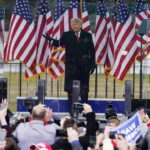
Vladimir Putin who reimposed Soviet-style dictatorship in his 23 years as leader of Russia, has also engineered a series of international power grabs. He invaded and annexed parts of two former colonies (Georgia in 2008) and Ukraine in 2014-2022), supported Syria’s dictator in his brutal crushing of civil war in Syria (2012-2022), and killed thousands of Muslims in the Russian province of Chechnya.
Presidents G. W. Bush, Barack Obama, and Donald Trump under reacted to these and other displays of Putin’s attempts to recreate the Soviet/Russian Empire, although Obama and other NATO members eventually imposed painful economic sanctions on Russia after the annexation of Crimea and takeover of two other Ukrainian provinces in 2014. President Trump and Biden escalated defensive military and economic aid to Ukraine. All NATO members increased their defense budget contributions to European security. However, Putin remains largely undeterred, especially in regard to his appetite to re-conquer Ukraine (independent Ukraine now seeks European Union and NATO membership).
Gun crime: Here’s what happened the night a Galesburg gun shop burglary turned bloody, Jan. 6, 2021
While Joe Biden’s chaotic and catastrophic (for the image of U.S. power) retreat from Afghanistan in 2021 embolden adversaries like China, Iran, and Russia, he is standing tall against Putin’s push to conquer in Europe. While pledging no U.S. troops to engage Russian troops if they invade the rest of Ukraine, he has rebuked Putin for his invasion preparations, played team-ball with other committed NATO allies, and revealed satellite and other intel on Russian troops (150,000+ on Ukraine’s borders), weapons, and maneuvers. He increased military aid to Ukraine and several nearby NATO members. He predicts Russia will invade, but will pay a huge economic and public relations price for invasion. Many tens of thousands of Ukrainians and thousands of Russians will die as a result. Biden and NATO pledge to impose new widespread economic sanctions (likely including the halting of the Russian-German oil pipeline) should Putin attack.
President Biden hopes that a consistent resistance to Putin’s plans for conquest and to undermine NATO unity will convince Putin to withdraw. As President Reagan said as he helped collapse the Soviet Empire in the 1980s, “Since the dawn of the atomic age, we’ve sought to reduce the risk of war by maintaining a strong deterrent and by seeking genuine arms control. “Deterrence” means … making sure any adversary who thinks about attacking the United States, or our allies, or our vital interests, concludes that the risks to him outweigh any potential gains. Once he understands that, he won’t attack. We maintain the peace through our strength; weakness only invites aggression.” While Putin masses front-line troops on Ukraine’s borders and pledges to dry-run nuclear missiles as a part of maneuvers on the border, Putin has also said he has no intention to invade and that diplomacy on Russian terms could commence.
More: Roundtable: Grading President Biden’s first year in office
However, as the Biden administration and NATO leaders know, Putin’s nuclear saber-rattling and his version of diplomacy are problematic and appeasement is not an option. Putin regrets the collapse of the Soviet empire, intends to restore Russian global power, and insists that former colonies bordering Russia must be “pro-Russian” and under Russian control just as in the good old days before the West interfered. Most of the former Soviet satellites (colonies) fled into Europe and NATO after the Soviet Union collapsed. Ukraine remained neutral and even returned to Russia the nuclear missiles that the Soviets had placed in Ukraine. The Russians in exchange pledged to do do nothing to endanger Ukrainian security. But Putin’s revanchist (I want all of Ukraine) pressures on Ukraine literally drove it westward as it sought to be European, independent, and secure.
It will be a challenge to negotiate with Putin. But he does want success on the cheap. Putin hopes that threats, posturing, displays of military firepower, deception, and boldness will win the day as the West backdowns in the face of pressure. Clearly NATO unity (there are 29 members) is sometimes vulnerable to conflicting interests and economic priorities. And, all have rejected war in Europe since WW II. Biden’s inconsistent foreign policy of retreat (Afghanistan, the Middle East, and so on) also makes the U.S. vulnerable to a determined aggressor or global power-seeker. So Putin may have hoped, to exploit Western appeasement to take Ukraine with little Western response.
However it looks like Biden’s and NATO’s firm commitment to Ukraine and to resist Putin’s aggression by way of renewed economic sanctions and military vitality surprised Putin and may convince him to negotiate rather than invade. If he pursues empire-by-aggression it will be a tragedy for Ukraine, but also for Russia as it will face a renewed NATO mission.
Louisa Sue Hulett is Professor Emerita (Political Science) at Knox College.
This article originally appeared on Galesburg Register-Mail: Sue Hulett: Economic sanctions may make Russian invasion too costly




